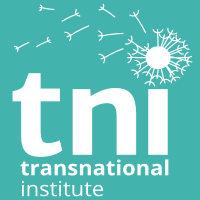Location
The Transnational Institute (TNI) is an international research and advocacy institute committed to building a just, democratic and sustainable world. For more than 40 years, TNI has served as a unique nexus between social movements, engaged scholars and policy makers.
The Transnational Institute (TNI) is an international research and advocacy institute committed to building a just, democratic and sustainable world.
Founded in 1974 as a network of ‘activist scholars’, TNI continues to be a unique nexus between social movements, engaged scholars and policy makers.
TNI has gained an international reputation for carrying out well researched and radical critiques and anticipating and producing informed work on key issues long before they become mainstream concerns, for example, our work on food and hunger, third world debt, transnational corporations, trade, and carbon trading.
As a non-sectarian institute, TNI has also consistently advocated alternatives that are both just and pragmatic, for example developing alternative approaches to international drugs policy and providing support for the practical detailed work of public water services reform.
TNI's Projects
TNI works on a wide range of interlinking issues. The constant interaction between fellows and projects gives TNI a unique, broad and informed perspective and enables a cross-disciplinary approach to complex global problems.
TNI's work currently includes:
- Leadership as a respected global voice on drugs policy, promoting a pragmatic approach to tackling illegal drugs based on harm reduction principles.
- Supporting a dynamic international network involved in building participatory, public sector water as the best way to achieve the goal of water for all
- Confronting the dogma of trade liberalisation, which like financial liberalisation has led to increased inequality, and helping to construct regional alternatives, such as the Bolivarian Alternative for the Americas, based on regional cooperation and solidarity
- Analysing and exposing the democratic dangers posed by the concentration of corporate power and proposing new legal frameworks of accountability for transnational corporations.
- Engaging with democratic innovations and experiments undertaken by social movements, progressive political parties and governments worldwide helping to empower communities to gain control over their lives and environment
- Drawing together and analysing the links between the different elements of the systemic crisis —financial, environmental and social.
Members:
Resources
Displaying 41 - 45 of 53FPIC Fever: Ironies and Pitfalls
Free, Prior and Informed Consent (FPIC)...
Text box extracted from "Access Denied -
Land Rights and Ethnic Conflict in Burma" by TNI/BCN,
May 2013 at http://www.burmalibrary.org/sites/burmalibrary.org/files/obl/docs15/TNI-...
Access Denied - Land Rights and Ethnic Conflict in Burma
The reform process in Burma/Myanmar by the quasi-civilian government of President Thein Sein has raised hopes that a long overdue solution can be found to more than 60 years of devastating civil war...
Protecting carbon to destroy forests: land enclosures and REDD+
This paper argues that REDD+ will not stop forest destruction developing countries and the underlying causes of deforestation remain untouched. The paper suggests that because REDD+ is embedded in the logic that environmental destruction in one location can be ‘compensated’ in another, it acts to reinforce the underlying drivers of deforestation and climate change. It also gives forest destroyers a way to legitimise their actions as environmentally ‘friendly’ or ‘carbon neutral’.
Land Grabbing in Dawei (Myanmar/Burma): An (Inter)National Human Rights Concern
ABSTRACTED FROM THE PROGRAM DESCRIPTION: In recent years, various actors, from big foreign and domestic corporate business and finance to governments, have initiated a large-scale worldwide enclosure of agricultural lands, mostly in the Global South but also elsewhere. This is done for large-scale industrial and industrial agriculture ventures and often packaged as large-scale investment for rural development.
The Global Land Grab. A Primer
Asks and responds to a series of questions about land grabbing, including what is it, what is its scale, its history, its impacts, how does it take place, what is new, how is it tied to water grabbing, what is green grabbing, who or what are the main drivers, what is the role of the EU, what solutions have been proposed, why are guidelines and transparency not sufficient, what systemic changes are needed, what does the concept of food sovereignty have to offer, and what resistance is being undertaken?





